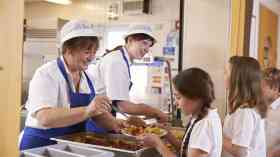
Widening access to the arts
At a time when arts provision in schools is at risk and access is unequal, a creative curriculum with high-quality arts provision is vital. Jane Ball, deputy head of school engagement at the National Theatre, explains why this is important and how schools can improve their arts provision.
Since 2010, there has been a significant decline in the take up of arts subjects, with 42 per cent less GCSE entries. Fewer specialist teachers are being trained and schools are under pressure to prioritise core subjects, meaning that opportunities to take part in the arts and develop creative skills are becoming increasingly limited.
The arts, however, are a vital part of a broad and balanced education. An arts-rich education provides opportunities to think creatively, solve problems and develop critical responses; skills which are valuable both across the curriculum and in future employment. We also know that access to the arts has a positive impact on the wellbeing of young people.
A recent Skills England report found that creative thinking is one of the key essential employment skills projected to be most in demand by 2035. However this year, the DCMS published data showing that 30 per cent of job vacancies in the UK’s thriving cultural sector are down to skills shortages. Arts organisations like the National Theatre have an important role to play in supporting schools and teachers to inspire and create future theatre-makers and audiences, as well as boosting key transferable skills for a career in any sector.
Engaging with young people
As the National Theatre, we aim to reach every young person in the country through one of our productions or learning programmes, before they leave school. Through a combination of in-person and digital engagement, we hope that students can experience the magic and spectacle of theatre, wherever they are in the country. We work at scale to inspire creativity, spark imagination, boost skills and open career pathways.
Over the last few years, we have expanded and adapted our offer for schools in order to meet changing needs. Alongside live performances in London and on tour nationwide, we also offer an online streaming service, digital classroom resources, training for teachers and a range of workshops and events for students. We know that due to time and budget constraints, it is becoming increasingly difficult for teachers to take pupils on school trips or to the theatre and so it is even more important that we create accessible ways for teachers to engage with us and provide creative opportunities for their pupils.
We consult with teachers in the planning of all of our work and aim to make it easy for teachers to integrate resources into their curriculum.
In 2019 we launched the National Theatre Collection, our educational streaming service, which allows teachers and students to watch 70 world-class theatre productions in the classroom. The NT Collection is available free of charge for all UK state-funded schools and via a subscription for independent schools and other educational institutions worldwide. Teachers can show plays in their entirety, or focus in on particular scenes. The resource is designed to directly support curriculum learning. It is most widely used by GCSE and A Level English and drama teachers, who use it in the teaching of a set text, to explore contemporary theatre practice or prepare students to write a live theatre review. GCSE English students can see Macbeth or Romeo and Juliet come off the page, with vibrant productions that aid their understanding of character, interpretation and Shakespeare’s use of language.
Drama and English students can explore some of the newer set texts that aim to diversify the curriculum and enable students to see themselves reflected in theatre and literature. Productions like Small Island, Barber Shop Chronicles and The Great Wave enable students to engage with and understand global stories. Many schools also use it to introduce their students to the magic and joy of theatre, setting up whole-school screenings to share the experience of Peter Pan flying to Neverland, or the Hispaniola rising from the stage in Treasure Island. The productions are supported by an ever-expanding bank of learning resources, written with or by teachers and responding to curriculum requirements.
Resources for teachers
Alongside the NT Collection sits our Learning Hub, a searchable library of short-form video and PDF resources which are designed to support teachers in accessing and teaching a more diverse range of work, open up the practice of leading contemporary theatre-makers and inspire students to explore a broad range of theatre. One example of the many resources is Practitioners in Practice, which was conceived by theatre practitioner and director Katie Mitchell with the NT and in consultation with drama teachers nationwide to bring contemporary theatre practice into the classroom. Made up of a film for students and a supporting education pack for teachers, the resource explores Mitchell’s unique style and methodology, and the methods students can use to replicate her work in classroom settings with varying resources and budget. Practitioners like Katie Mitchell also play a key role in the continuing professional development opportunities that we create for teachers.
Each year we run a two-day Drama Teacher Conference, where teachers from across the country come together to take part in workshops with leading artists. Drama teachers are an integral part of the ecology of the theatre industry, inspiring and developing future artists, and the conference is an opportunity celebrate them. It’s also an opportunity for valuable peer-to-peer learning, with teachers sharing the brilliant work they’re doing in their schools with each other. This year, we’re delivering the conference in partnership with Lowry and they will be hosting it in Salford – we’re hoping to welcome lots of new teachers to the event.
Partnerships
Our partnership with Lowry is a long-standing one. They are part of Theatre Nation Partnerships, an Arts Council-Funded initiative which has seen regional venues come together with the National Theatre to widen participation in the arts and develop and sustain audiences in areas of low arts engagement. One of the successes of the project has been a programme of schools touring, enabling young people to see high-quality live theatre in their school. Last year, 10,000 secondary school students from all around the country saw a production of Jekyll & Hyde. At the start of 2025, a production of The LeftBehinds, a new play co-created by Bristol-based playwright Ross Willis and director Ned Bennett will embark on a national tour. The aim of the schools tour is to reach young people who have little or no experience of live theatre. School halls are magically transformed into a theatre-space for the day and hundreds of students sit, in the comfort of their own school environment, transfixed by the performance. At the end of each show, students have the opportunity to ask questions of the actors and stage management team, not only to find out more about play, but also about the people who make it. It’s a great opportunity for us to be able to showcase creative careers.
Career opportunities
Opening up careers in the industry and creating pathways into it for all young people is another important area of our work. This includes programmes like Young Technicians, which introduces young people to a range of backstage and technical roles and gives them hands-on experience and our thriving apprenticeships scheme.
This is just a snapshot of what the National Theatre is doing to inspire and train our future workforce and to address the growing skills shortage we know exists across the sector.
At a time when arts provision in schools is at risk and access is unequal, we are advocating for a creative curriculum with high-quality arts provision. We are committed to working with schools and teachers to widen access to the arts and inspire young people. We urge teachers to find ways to bring creativity into the classroom as often as they can, to watch a production, use our resources, join our CPD opportunities and share the joy of theatre with their students.
To find out more about upcoming opportunities for schools and teachers please visit the website below
Latest News
04/11/2025 - 09:55
The policy introduces the new Chief Regulator’s Rebuke - a new tool which can be used when an awarding organisation is found to have breached rules, but not in a way that warrants a financial penalty.
03/11/2025 - 10:04
The government has launched a new campaign supported by Sport England that aims to help parents discover simple ways to build movement into daily life during the winter months.
03/11/2025 - 09:55
Nearly eight in ten UK teachers have had to rethink how they set assignments because of Artificial Intelligence (AI), according to a new British Council survey.
31/10/2025 - 10:12
A growing number of UK children are now eligible for Free School Meals (FSM), yet most still aren’t taking advantage of them on a daily basis, new research reveals.
30/10/2025 - 01:28
In the wake of the Raac crisis, the DfE spent £5 million on research into the condition of school buildings, which is due to conclude in spring 2026.







